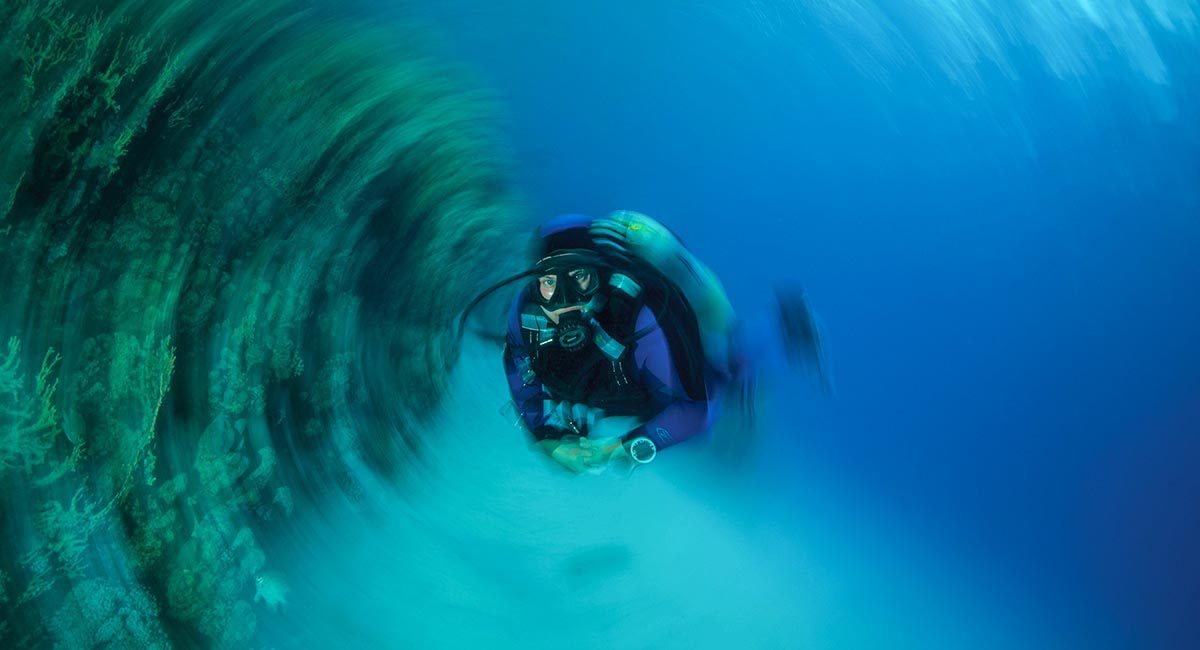Pain is the most common symptom of ear injury, but the most alarming symptoms are vertigo, tinnitus and acute deafness. All three symptoms may be caused by a variety of acute and chronic medical conditions that affect fitness to dive. Acute onset of these symptoms in relation to diving may indicate inner-ear barotrauma or decompression sickness and should prompt medical evaluation.
Vertigo is often confused with dizziness, which has different causes and implications. Divers should be familiar with these symptoms so that they can recognize potential problems and intervene appropriately.
In this chapter, you’ll learn about:
Seasickness or Motion Sickness
Seasickness is a condition individuals may experience when on a moving platform. It involves a general feeling of illness, dizziness, nausea and vomiting. It is also called motion sickness. Passive motions disturb fluid movement within the labyrinth and affects one’s sense of balance and equilibrium. It is exaggerated when the brain receives conflicting messages delivered from the eyes, muscles and joint sensors (proprioceptors). In a closed room, the view indicates that the surroundings are still, while the signals from the labyrinth indicate that the body is moving.
Motion sickness can occur when traveling on a ship, plane, train, bus or car. Some people are more sensitive than others, but if the motion stimuli are strong and the exposure lasts long enough, nearly all individuals will experience it.
Symptoms
The symptoms of motion sickness include dizziness, sweating, nausea, vomiting and a general feeling of discomfort or illness. Symptoms can strike suddenly and progress from simply not feeling well to cold sweats, dizziness and vomiting. Motion sickness is more common in women and in children 2-12 years old. Individuals who suffer from migraine headaches are also more prone to motion sickness. Motion sickness lasts as long as the motion lasts. Once the motion stops, symptoms quickly subside. Some people feel “sea legs” after a long sojourn at sea.

Prevention and Management
If you know you have motion sickness or might be prone to it, consider this advice:
- On a boat: Stay on deck and focus on the horizon. Avoid inhaling exhaust fumes.
- In a car: Sit in the front seat. If you are the passenger, look at the scenery in the distance.
- Do not read in moving vehicles. Reading makes motion sickness worse.
- Avoid heavy meals prior to diving.
- Drink plenty of water.
- Avoid alcohol the evening before you travel.
- If possible, stand up. Sitting or lying down can make you feel worse.
- Eat dry crackers to help settle a queasy stomach.
- Avoid others who have become nauseous with motion sickness.
Treatment
Motion sickness can be treated with over-the-counter and prescription drug products.
- Over-the-counter products: Antihistamines are commonly used both to prevent and treat motion sickness. A side effect of antihistamines is drowsiness, which is exaggerated when alcohol is consumed. Drowsiness may adversely affect diver safety.
- Prescription products: The scopolamine skin patch (Transderm Scop) is a popular option. The patch is applied to the skin area behind the ear at least eight hours before exposure and can help prevent motion sickness for up to three days per patch. Scopolamine may cause dry mouth, blurry vision, drowsiness and dizziness. Patients with glaucoma, enlarged prostate and some other health problems should not use this drug. Be sure to tell your doctor of your existing health problems to help determine which drug is best suited for you.
- Alternative remedies: Various alternative remedies have been promoted as being helpful in relieving or preventing motion sickness. In most cases, the evidence of efficacy is missing. However, if you have mild symptoms, you may try ginger or peppermint products to ease your symptoms without risking side effects.
Vertigo
Vertigo is the persistent feeling of tilting, swaying, whirling or spinning motion of oneself or of the surrounding world when nothing is moving.

Vertigo during or after diving is a common symptom of middle-ear or inner-ear injury. It is often associated with nausea and in severe cases vomiting. If vertigo happens underwater, the diver may not be able to tell which way is up; panic and vomiting may cause choking and drowning. On land, the patient may not be able to sit or stand
There are various causes of vertigo. In diving, it is most often caused by inner-ear barotrauma. It can also occur from stimulation of one side and not the other, such as when the pressure difference in only one ear equalizes (alternobaric vertigo) or when cold water enters one ear but not the other (caloric vertigo). This type of vertigo disappears as the condition equalizes and leaves no lasting effects except that the associated disorientation, nausea and vomiting while underwater may contribute to diving accidents.
Vertigo is an acute symptom of vestibular injury that may be associated with other symptoms, some of which may become chronic. Symptoms may include imbalance and spatial disorientation, vision disturbance, hearing changes, involuntary eye movement (nystagmus), and cognitive and/or psychological changes, among others.
Differential Diagnosis
Vertigo is not the same as dizziness, lightheadedness or unsteadiness. When you’re dizzy, you may feel lightheaded or lose your balance. If you feel that the room is spinning, you have vertigo.
For vertigo, differentiate between inner-ear decompression sickness (DCS) and inner-ear barotrauma.
General Guidance
- Vertigo occurring briefly during or after a dive and resolving spontaneously requires evaluation of Eustachian tubes before resuming diving.
- Persistent vertigo is a sign of serious conditions and requires urgent evaluation by an ENT specialist. For an ENT referral in your area, email , or call the DAN Medical Information Line at +1 (919) 684-2948.
- Severe persistent postdive vertigo is an emergency.
Fitness to Dive
Damage to vestibular organs by DCS, barotrauma or acoustic shock may be permanent. In case of single-ear injury, vertigo may go away in two to six weeks, because the brain learns to compensate and ignores the side that is damaged, but the canal will not heal. The diver will have difficulties maintaining balance in the dark when deprived of visual clues. Damage to both vestibular organs is debilitating and may make certain life activities (such as driving a car) challenging or impossible.
Persistent or recurrent vertigo, even if controlled by medications, is disqualifying for diving.
Return to diving after inner-ear barotrauma or DCS should be evaluated on an individual basis depending on the extent of permanent injury of inner-ear organs.
Tinnitus (Ears Ringing)
Tinnitus is noise or ringing in the ears.
Tinnitus is the sensation of an external sound that is not actually present. Tinnitus (ears ringing) affects approximately one in five people and can be caused by many medical conditions.
Tinnitus is the sensation of an external sound that is not actually present. Tinnitus (ears ringing) affects approximately one in five people and can be caused by many medical conditions.
Possible Diagnoses
It is important to find the underlying cause of the tinnitus. Acute tinnitus occurring during or after diving is likely related to ear barotrauma or inner-ear DCS. If associated with diving, your physician must determine whether it is barotrauma or inner-ear DCS, because the treatments are not the same, and administering the wrong one can be harmful.
Other possible causes of tinnitus include:

- Concussion
- High-intensity noise or blast
- Infection
- Ear infection (otitis media)
- Tumor
- Temporomandibular joint (TMJ) dysfunction
- Foreign body in the ear
- Vascular abnormality
- Meniere’s disease
- Hypertension
- Migraine
- Some medications (including aspirin and quinine)
- Various poisonings (such as carbon monoxide, nicotine and heavy metal)
Fitness to Dive
If tinnitus is not related to diving and the underlying problem is not a contraindication for diving, there is no reason to curtail diving because of tinnitus itself.

Hearing Loss/Deafness
Hearing loss or deafness is the partial or complete loss of hearing from normal baseline.
Complete or partial hearing loss can occur for a variety of reasons. There are several diving-related causes including barotrauma, decompression sickness (DCS) and damage to the inner ear.
Hearing loss can be classified as conductive or sensorineural.
- Conductive hearing loss involves the ear canal, eardrum and tiny bones of the middle-ear ossicles; these anatomical components mechanically conduct sound to the inner ear, where electrical signals are generated.
- Sensorineural hearing loss involves the brain, the eighth cranial nerve or the inner ear.
Possible Diagnoses
There are many causes of hearing loss, including infection, blocked ear canal, barotrauma, drugs, trauma, round- or oval-window rupture, stroke, Meniere’s disease, noise and medications.
Fitness to Dive
Although uncommon, dive-related permanent hearing loss resulting from ear barotrauma or inner-ear DCS is possible. If the injury causes permanent unilateral (one ear only) hearing loss or impairment, most physicians will recommend against a return to diving. This is often recommended because if subsequent diving resulted in injury to the remaining functioning ear, the individual may experience permanent bilateral hearing loss. This recommendation applies to all monaural (one-sided hearing) individuals, regardless of the cause of unilateral hearing loss or impairment.
An additional population for whom diving is often discouraged or extreme caution is advised includes those who have undergone cochlear-implant surgery, ossicle surgery or tympanic-membrane repair (myringoplasty.) Diving places individuals with this medical history at risk of damaging the surgical repair, resulting in hearing loss. For divers who have undergone such procedures or suffered permanent hearing loss from ear barotrauma, extreme caution is often recommended, and close consultation with an ENT physician prior to diving is highly advised. For a referral in your area, email , or call the DAN Medical Information Line at +1 (919) 684-2948.
It is important to mention that bilateral hearing impairment (either congenital or acquired) does not necessarily medically preclude someone from diving. However, in cases of bilateral hearing impairment, a diving environment may pose potential difficulties with surface communications, both with other divers and with crew members. Obstructed communications in cases regarding boat traffic, diver recall and other unforeseen circumstances may result in delayed emergency response, injury or death.
Next: Chapter 4 – Hygiene >
